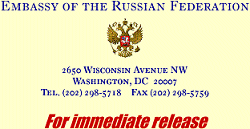
Press
Release #9
February 27, 1998
THE RUSSIAN-IRANIAN NEGOTIATIONS
February 12, 1998
Russian Foreign Minister Ye.M. Primakov held negotiations on February 25, 1998, with Iranian Foreign Minister K. Kharrazi who was on an official visit to Russia. The negotiations passed in a friendly and constructive atmosphere.
1. Having discussed the state of the Russian-Iranian relations in a business-like and open way, Ye. Primakov and K. Kharrazi came out for the further development of the mutually-beneficial cooperation in the political, trade, economic, scientific, technical and other areas.
2. The foreign ministers of the two countries stressed the need for a peaceful solution of the existing conflicts and expressed the readiness for interaction and active participation in international efforts for their settlement.
3. In this context, Ye. Primakov and K. Kharrazi stated that Russia and Iran welcome the arrangement signed in Baghdad by the United Nations Secretary-General and the Iraqi government, which showed convincingly the possibility of resolving the crisis over Iraq by political means. A peaceful settlement is the success of the entire international community and is the confirmation of the United Nations' ability to be effective in settling conflicts. It is now important to ensure prompt implementation of the Baghdad arrangements, which in the context of fulfilling by Iraq of appropriate resolutions of the UN Security Council would open the way for its reintegration into the international community.
4. The sides expressed satisfaction with the achieved level of coordination of efforts on the Tajik track. They confirmed their intention to continue assistance to the inter-Tajik peace process and to vigorously promote the enlistment if international economic aid to Tajikistan.
5. While considering the situation in Afghanistan, the sides expressed concern that continued confrontation of Afghan groupings has a destabilizing effect on the situation in the region. In that respect possible political actions to put an end to the conflict and to promote national reconciliation were discussed.
6. During the exchange of opinions on the Middle East situation the Ministers stressed that a fair peace settlement can only put an end to the crisis in the region.
7. A detailed exchange of opinions took place on the problems of the Caspian. The sides arrived at a conclusion that it is necessary to speed up the adjustment of the legal status of the Caspian Sea and supplement it on a basis of unanimity with taking into account the interests of all littoral states and without interference of non- littoral states, so as to ensure an optimum solution of pressing economic and ecological problems related to this unique reservoir, and to ensure the Caspian Sea becoming a sea of peace, good-neighborliness, and mutually-beneficial cooperation. The sides came out against the construction of pipelines and transportation of oil and gas along the Caspian seabed as this may cause irreparable harm to the ecology of this reservoir.
8. Reaffirming again their invariable commitment to the principles of the United Nations Charter and to the international obligations they have assumed, the sides declared for continuing the cooperation between Russia and Iran in peaceful use of nuclear energy under effective supervision of the International Atomic Energy Agency (IAEA). They rejected as utterly groundless various assertions about alleged cooperation between Russia and Iran in the creation of weapons of mass destruction in Iran.
9. The ministers positively assessed the development of a dialogue between the two countries on export control for which specific actions are being already taken.
10. Ye. Primakov and K. Kharrazi reaffirmed their countries' decisive condemnation and rejection of terrorism in all its manifestations.
February 27, 1998
[end]
|
NEWSLETTER
|
|
Join the GlobalSecurity.org mailing list
|
|
|


